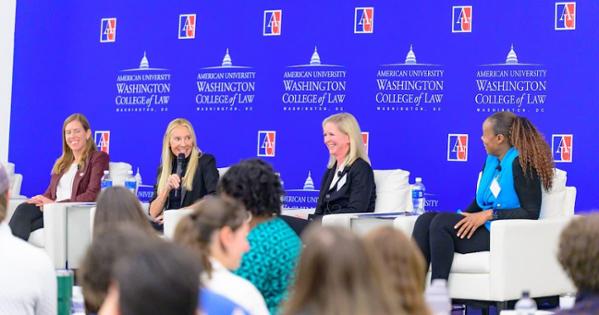At the Top of Their Game

A roster of the some of the most powerful sports executives in the country—all of them women—chronicled their rise to the C-suite during a lunchtime panel, November 13, at AU’s Washington College of Law.
The event, sponsored by WCL’s Sport and Society Initiative, featured four general counselors representing six Washington sports teams: the Commanders’ Mali Friedman, the Spirits’ Shameeka Quallo, the Nationals’ Betsy Philpott, and Abby Blomstrom of Monumental Sports and Entertainment, which owns the Washington Capitals, Wizards, and Mystics.
The District is one of only a few cities in the country where all professional sports teams are helmed by a female lawyer. (DC United’s Jessica Wright was not in attendance.)
Across all industries, women make up just 28 percent of C-suite executive roles, according to McKinsey and Company data, while 38.5 percent of all general counsels are women, according to Zippia. In sports, those gender disparities are often even more pronounced—especially when they intersect with other marginalized identities.
“Anytime I walk in [the room], there are two things that are undeniable: I am a Black woman,” Quallo said. “That’s sort of been my story of being in rooms, places, and spaces where I don’t see a lot of people who look like me. Inherently, it’s something that’s top of mind, but it’s also embedded in how I show up. I’m always mindful of who else I’m bringing with me.”
“It’s important to be very conscientious about it,” added Philpott, senior vice president and general counsel for the Washington Nationals. “Live intentionally with that in mind when you’re going to work, especially if you’re a female leader.”
The conversation was moderated by Julie Jensen, SPA/BA ‘95, WCL/JD ’02, a former executive for the now Commanders and founder and co-CEO of Jasper Advisors, who also gave space for the panelists to explain the responsibilities of a general counselor.
The top lawyer for each team handles all legal matters, including business transactions, contracts, litigation, and risk management advice. It’s a job that touches every aspect of the organization.
“I work very closely with basically every department, and I think that probably goes for all of my colleagues up here too,” Philpott said. “It’s really important that you, as a lawyer, establish strong relationships across all departments because the most important thing you can get from everybody is information. If you don’t trust that you’re going to use that information well, then they’re not going to give you that information.”
Each panelist also shared about how they ended up in sports law. While the others had always planned to work in sports, Blomstrom, former assistant general counsel at AOL, fell into it.
“It wasn’t something I was planning to do,” she said. “It was a little bit of a leap, but it’s been super rewarding. And as everyone has said, every day is different.”
Friedman’s path to becoming chief legal officer and senior vice president for the Commanders also required a leap of faith. After working for the Golden State Warriors—and being part of two championship runs—she left for the XFL, which folded just eight months after it launched, due to the pandemic.
Out of a job, Friedman headed back to the DMV, where she grew up. Now, she is proud to be part of a senior leadership team that is comprised of 53 percent women and 47 people of color under President Jason Wright and new ownership.
“It’s been great to see the cultural transformation,” she said. “You feel the difference. You end up making better business decisions and getting better results when you have a diverse group of opinions and backgrounds in the room.”
The event closed with WCL students asking for advice on how to break into sports law—including how to prepare for all the roles they’ll need to play within an organization.
“There’s no way you can learn all the things you’re going to need to do in a more generalist role,” Friedman said. “You absolutely will learn along the way.”
